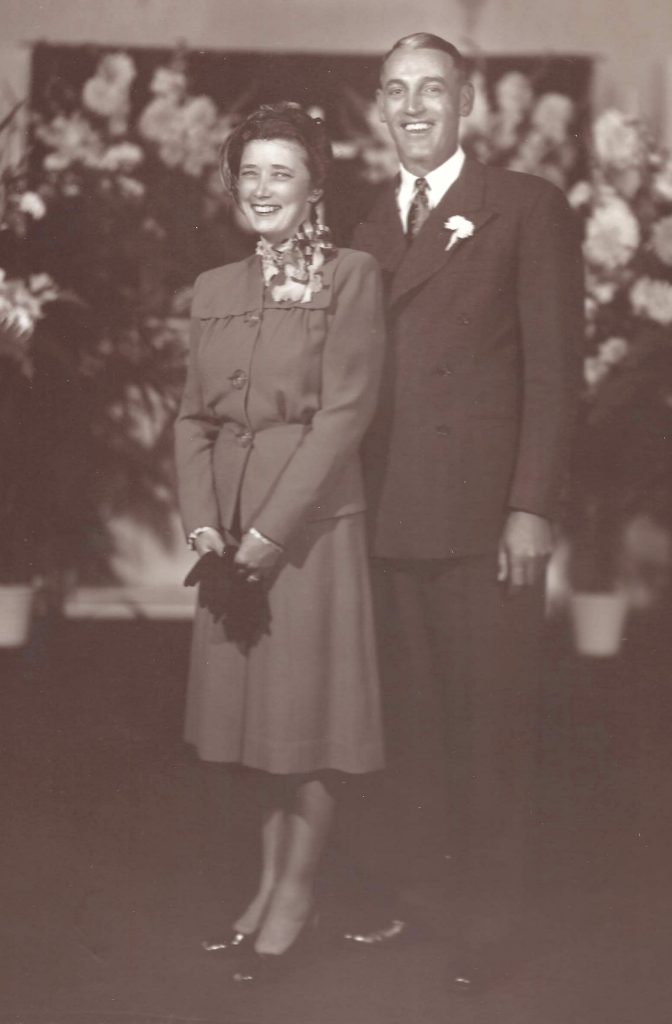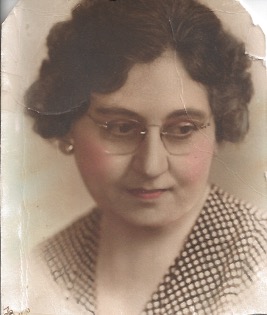Warrior Women, Part Two

AIRCRAFT/ROCKET WORKER – Edith Lenore (Lionberger) Alkire, 42, grandaunt:
By 1943, beautiful, intelligent Edith was performing war work. Her job was to lead a small but vital group of women machinists, filling rocket propellant orders at California Institute of Technology (CIT), in later years known as CalTech. She married in September of 1944 and continued her important work at CIT.
In January of 1945, Edith wrote to my father as he was preparing to join the Merchant Marine. Here is an excerpt from newlywed Edith’s letter:
“I have been glad of having a real part in trying to bring this terrible war to an end. You probably already know that I work with the very effective Rockets and have had a real part in every new one which has been developed in this country in the last two years, as I am head of the machining dept. in the experimental development of all the new Rockets. We carry out the orders for each new type of propellant for the Rockets on the day shift only in the one little station, of which I have the happy privilege of being the head.
So, if when you become a Merchant Marine, you happen to be carrying cargo which says from C.I.T. Pasadena, Calif., you will know your old auntie has had a hand in it. Forgive me if I seem to be bragging. I do not mean it to be so but just can’t help being proud of having a part in such a successful weapon.
Don and I are getting along beautifully, he surely is a fine husband, just right for me. I find it rather hard to work and keep up a home, but not too difficult. And I don’t feel right about quitting my job until Germany is licked. Lovingly, Edith and Don.”

CHILDCARE – Louise (Hooton) Lionberger Emmons, 48, grandmother:
Louise wrote to my father in late September of 1945–just after the official close of the war. The nation was still struggling economically, and he was still away serving in the Merchant Marine. “I’m taking care of a little neighbor girl,” she wrote, “whose mother works at the shipyard. She pays me $1.00 per day. Said she didn’t know how long it would be before she would be laid off–as a great many are losing their jobs now at the shipyards.”
Besides caring for a shipyard worker’s child, Louise grew her Victory Garden, canned food, kept chickens for eggs, and raised rabbits for meat. During the war years, my grandmother, who wrote poems under the pen name Eloise Emmons, wrote a poem to express her feelings as a mother whose son was away because of war, which surely echoed the sentiments of millions of mothers across the globe. Entitled, “Again You’ll be There,” the final two stanzas read:
My prayer for you each day,
May God guide your way . . .
Then when spring comes again,
And trees are no longer bare,
We’ll watch for your return,
From voyages, over there . . .
Then, once more,
Things will be the same . . .
I’ll smile, as I speak your name,
For Son, when I look at your chair,
Again, you’ll be there . . .

OFFICE CLERK – Luella P. Moore, 48, 1st cousin 2x removed:
In my grandmother Louise’s home state of Missouri in 1944, Luella Moore, a relatively young widow since 1941, likely read the headline “Urgent Job Call” in a Kansas City newspaper. The article announced, “The army issued an extraordinary appeal today for skilled electrical workers to volunteer for jobs of at least ninety days on “vital war construction jobs” at the Hanford Engine Works, Pasco, Wash., . . .” These vital war construction jobs left the Hanford location a unusable desert, now part of the Manhattan Project National Historical Park.
According to Luella’s obituary of 1986, she became an employee of General Electric Corp. in Richland in 1945, where she worked for twenty years. Luella is listed on the 1950 census of Richland City, Benton County, State of Washington as a lodger at the Hanford Works dormitory, whose occupation was office clerk in the health industry. One might wonder what Luella and the hundreds of other lodgers on the Hanford Reservation were asked to do in the performance of their jobs, and how many may have suffered the results of radiation exposure.
